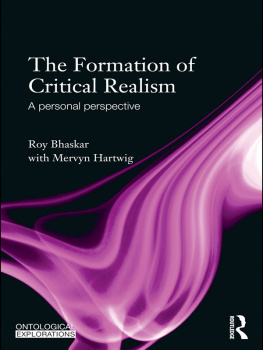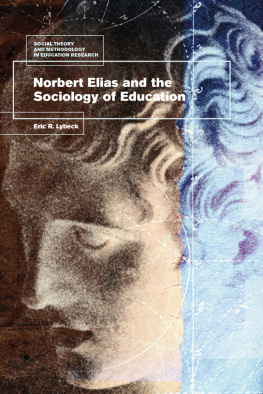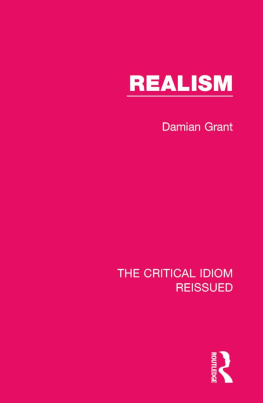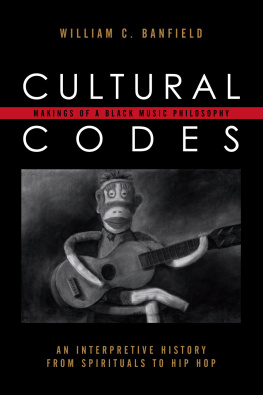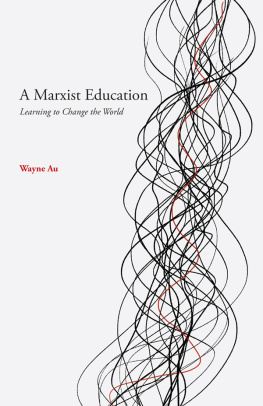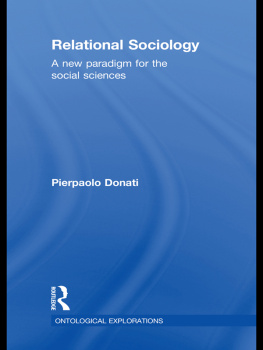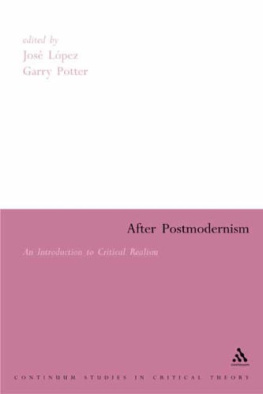Critical Realism for Marxist Sociology of Education
This book offers a critical realist intervention into the field of Marxist Sociology of Education. Critical realism, as developed by British philosopher Roy Bhaskar, is known for its capacity to serve as a conceptual underlabourer to applied fields like education. Indeed, its success in clarifying and resolving thorny issues of educational theory and practice is now well established. Given critical realisms sympathetic Marxist origins, its productive and critical engagement with Marxism has an even longer history. To date there has been little sustained attention given to the application of critical realism to Marxist educational praxis. The book addresses this gap in existing scholarship.
The books conceptual ground clearing of the field of Marxist Sociology of Education centres on two problematics well known in the social sciences: naturalism and the structureagency relation. Marxist theory from the days of Marx to the present is shown to also be haunted by these problematics. This has resulted in considerable tension around the meaning and nature of, for example, reform, revolution, class determinism and class struggle. With its emergence in the 1970s as a child of Western Marxism, the field continues to be an expression of these tensions that seriously limit its transformative potential. Addressing these issues and offering conceptual clarification in the interests of revolutionary educational practice, Critical Realism for Marxist Sociology of Education provides a new perspective on education that will be of interest to students, scholars and practitioners alike.
Grant Banfield is currently an academic worker at the Flinders University of South Australia.
New Studies in Critical Realism and Education
A Critical Realist Perspective of Education
Brad Shipway
Education, Epistemology and Critical Realism
David Scott
Why Knowledge Matters in Curriculum
A social realist argument
Leesa Wheelahan
Strong and Smart Towards a Pedagogy for Emancipation
Education for First Peoples
Chris Sarra
Imagining the University
Ronald Barnett
Critical Realism for Marxist Sociology of Education
Grant Banfield
First published 2016
by Routledge
2 Park Square, Milton Park, Abingdon, Oxon OX14 4RN
and by Routledge
711 Third Avenue, New York, NY 10017
Routledge is an imprint of the Taylor & Francis Group, an informa business
2016 Grant Banfield
The right of Grant Banfield to be identified as author of this work has been asserted by him in accordance with sections 77 and 78 of the Copyright, Designs and Patents Act 1988.
All rights reserved. No part of this book may be reprinted or reproduced or utilised in any form or by any electronic, mechanical, or other means, now known or hereafter invented, including photocopying and recording, or in any information storage or retrieval system, without permission in writing from the publishers.
Trademark notice: Product or corporate names may be trademarks or registered trademarks, and are used only for identification and explanation without intent to infringe.
British Library Cataloguing in Publication Data
A catalogue record for this book is available from the British Library
Library of Congress Cataloging-in-Publication Data
Banfield, Grant.
Critical realism for marxist sociology of education / Grant Banfield.
pages cm. (New studies in critical realism and education)
Includes bibliographical references and index.
1. Marxian school of sociology. 2. Critical realism. 3. Educational
sociology. I. Title.
HM471.B36 2015
301.01dc232015014367
ISBN: 978-0-415-62906-5 (hbk)
ISBN: 978-1-315-68521-2 (ebk)
Typeset in Times New Roman
by Wearset Ltd, Boldon, Tyne and Wear
For Stephanie, Kayla and Jamie.
You have given so much to make this possible.
I take it that whatever our politics socialists can agree that what we must be about today is the building of a movement for socialism in which socialism wins a cultural-intellectual hegemony, so that it becomes the enlightened common-sense of our age.
(Bhaskar, 1989: 1)
If you have picked up this book I imagine you are an academic, student or social activist with an interest in the radical potential of education for progressing social change. Simply the appearance of critical realism or Marxism in its title would be sufficient to indicate its broad commitments. In this sense, we come to these pages together. We are bound, as Bhaskar emphasises above, by a deep understanding of the need to build a cultural-intellectual hegemony for socialism. As Gramsci taught us, there is a world of difference between common sense and good sense, and the bridge between them is not an easy one to either find or to navigate. The reasons for this are historical and material. Good sense gets buried under the silt of common sense that is piled up by the apologists of capital who have the advantage of working with the aid of the heavy lifting machinery of media, law and the state. The ground-clearing challenge for humanity is to determine how to make good sense, common. In no small part this is an educational issue. But it is not one that can be limited to, or defined by, its contemporary bourgeois forms (schooling, higher education, etc.) that are themselves emergent from the logic of capital. Rather, it must find expression in forms that afford education the space to flourish in its full educere (i.e. enlightenment) sense. Radical praxis vitalises the pulse of freedom and opens history to the possibility of human making. It is the ever-present promise of such vitality that brings the emancipatory and revolutionary projects of critical realism and Marxism together in this book. Moreover, the book is unique in its exploration of education, critical realism and Marxism. Hopefully it is only a first, and it will stimulate further inquiry into and give force to education as a truly revolutionising practice.
I imagine there will be at least three kinds of readers who will be drawn to this project of exploring the possibilities of a critical realist Marxism for radical education. First, there will be those who are already working with either critical realist or Marxist ideas but are curious to explore the other field in its potential relation to their current interest. I hope this book will serve as a productive starting point for these efforts. Second, there will be those who are already considering the intersections of critical realism and Marxism. They will not only possess a working knowledge of both fields but also have a familiarity with at least some of the arguments outlined here. I would like to think that this book will provide new critical insights for their own work and reveal possibilities for further radical education projects. Third, it may be of interest to those who share the vision of education as socially transformative political praxis but are not particularly familiar with either critical realism or Marxism. If what they read serves as inspiration for their education projects or a stimulus to pursue the rich possibilities that critical realism and Marxism offer, then the book would have achieved it purpose.
My own path to this project began as an educator working within the field of Marxist sociology. Its impetus came from a need to better understand Marxist social theory in order to unravel some of its seemingly insurmountable conceptual tensions. Critical realism became my aid in this unravelling. I was the first type of reader described in the previous paragraph. Completely separate to the success or otherwise of this project, I am greatly indebted to Rachel Sharp who, in what seems like a lifetime ago, encouraged me to read Bhaskars early works. If the power of Marxism rested in it being a science (as this book argues it is) then the possibility of clarifying its concepts would reside in the meta-theoretical tools of a critical philosophy of science. So commenced my reading of critical realism and my induction into the world of philosophy. For someone with next to no background in formal philosophy, this was steep learning. While it was no easy task, I believe it has been fruitful. I have come to know and appreciate the wisdom in Marxs words that there is no royal road to science. Over time, I would read Marx more and more with the assistance of Bhaskar. In doing so I came to appreciate that this was not a burying of Marx but a process of conceptual ground clearing: the pushing away of silt heaped on Marx from both within and outside Marxism. Eventually my efforts would morph into a long and protracted PhD project that was finally submitted in 2010. The reasons for its time lag in appearing in published book form are beyond explanation here. However, I wish to acknowledge and express my thanks to the Routledge editorial team of the New Studies in Critical Realism and Education book series for their understanding and patience.



